Complete Guide to Parrot Care: Nutrition & Environment


Intro
Parrots make for vibrant and charismatic companions, but caring for them involves more than just giving them a snack now and then. Owning a pet bird can be as rewarding as it is demanding. Unfortunately, many new bird owners stumble down a rocky road filled with misinformation and misguided practices. This comprehensive guide aims to shed light on the crucial aspects of parrot care, melding the essentials like nutrition, habitat, and social behavior into one coherent narrative.
In our exploration, we’ll travel through various topics, such as the fundamental needs of these colorful birds, tips for setting up their living space, and understanding their unique behaviors. With the right knowledge, parrot owners can ensure their feathered friends thrive in a home that is both nurturing and stimulating. Let's dive into the birds' world and learn how to keep our avian companions happy and healthy.
Avian Care Basics
Caring for a parrot involves a grasp of several fundamental principles. Each aspect of parrot care supports the overall health and happiness of your pet bird.
Importance of Proper Nutrition
A parrot's diet is akin to a house's foundation; get it wrong, and everything comes tumbling down. There’s no shortage of advice on what to feed these colorful creatures, but understanding their specific dietary needs is crucial. Parrots—depending on species—may feast on seeds, fruits, vegetables, and even certain grains. A well-balanced diet for a parrot typically includes:
- High-quality pellets
- Fresh fruits and vegetables like carrots, broccoli, and apples
- Occasional nuts and seeds in moderation
Be cautious with avocado and chocolate, as these foods can be toxic to your feathered friend. Remember that variety is key; too much of anything, even the good stuff, can lead to health issues.
Understanding Bird Species and Their Needs
Not all birds are cut from the same cloth. For example, a cockatoo has different care requirements compared to a budgerigar. Therefore, getting to know your parrot’s species can make all the difference in how you provide care. While some species thrive on social interaction, others may prefer a quieter environment. Dive into the specifics of your bird's needs and adapt your care to reflect this. It’s not just about feeding them; it's about understanding who they are.
Basics of Birds Habitat Setup
Creating a comfortable environment for your parrot is non-negotiable. A spacious cage is a starting point, but it’s the little things that make it feel like home. Include toys that stimulate their minds, perches of various sizes for different activities, and safe spaces to explore. Keep in mind that lighting is equally critical—natural light can do wonders for their mood. Ensure that their habitat remains clean and well-maintained; a happy bird is a clean bird.
Grooming and Hygiene Tips
Grooming isn't just an occasional chore; it plays a big role in a parrot’s health. Regular nail trimming, beak maintenance, and feather care are integral. Bathing your bird helps keep their feathers in good condition and allows them to enjoy some play. Occasionally misting them with clean water can mimic their natural rainforest habitat. Just don’t overdo it; a damp environment can lead to mold.
Interacting with Your Pet Bird
Birds are social critters that thrive on interaction with humans and other birds alike. Establishing a good relationship with your pet can enrich both your lives.
Building Trust and Connection
Establishing trust isn’t a sprint; it’s more of a marathon. Spend quality time near your bird's cage, speak to it softly, and offer treats to bridge the gap. It may take some time, but your efforts will pay off when your feathered companion feels comfortable.
Training Techniques and Tips
Training may seem daunting, but teaching your parrot some simple commands can be rewarding; it creates mental stimulation and builds your connection. Start with basic commands like “step-up” or “come.” Use positive reinforcement, rewarding your bird with treats when they follow instructions, so they associate training with something enjoyable. Over time, you can even teach your parrot to mimic some words!
Fun Activities for Bird Owners and Their Birds
Think of imaginative games. Parrots love puzzles and challenges. Hide treats inside toys and let your bird figure out how to get them. Try exploring new areas together or setting up a safe play space outside the cage. This not only sparks their curiosity but also brings joy and bonding opportunities.
Recognizing Bird Cues and Behaviors
Being observant is key to understanding your parrot’s needs. From typical chirps to subtle body movements, your bird communicates its feelings often. If your bird is puffing up or biting its feathers, it might be stressed. Learning to read these cues is critical for their emotional well-being.
Emotional Well-Being of Birds
A parrot is not merely a pet; it's a part of your family. Their emotional health is as vital as physical health.
The Role of Play and Socialization
Birds are social beings that need companionship. Encourage playdates with other pets if appropriate, and engage them with toys and mental exercises. Socialization helps mitigate loneliness and anxiety.
Enhancing Birds' Emotional Health
Make time for cuddles and gentle talking. Your voice can be comforting for them. Establish a routine, as predictability can provide a sense of security.
Assessing Bird Stress and Remedies
Stress in birds is often manifested through behaviors like excessive screaming, feathers plucking, or hiding. Identifying stress triggers—be it loud noises, sudden changes, or a lack of social interaction—can help address these issues early on.
Building Strong Human-Bird Bonds
The bond you cultivate with your bird can define how happy both of you feel. Engage daily, narrate your day, and offer gentle pets if they permit. Building this connection fosters a stronger relationship.
Bird Health and Safety
Taking care of a parrot also means being vigilant about its health.
Common Health Issues and Prevention
Be aware of common ailments such as feather plucking, obesity, and respiratory problems. Monitoring their diet and environment goes a long way toward preventing these issues. Regular check-ups can also catch potential health concerns early.
Routine Veterinary Care
Regular veterinary visits are essential. Qualified avian veterinarians can provide specialized care for your feathered friend. Schedule annual checkups to ensure your bird remains in good health.
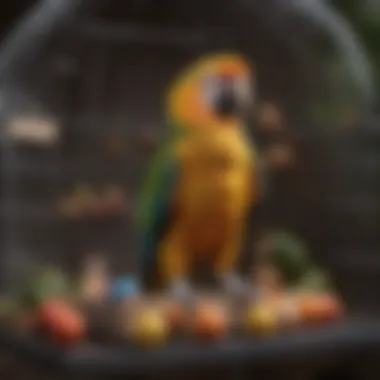
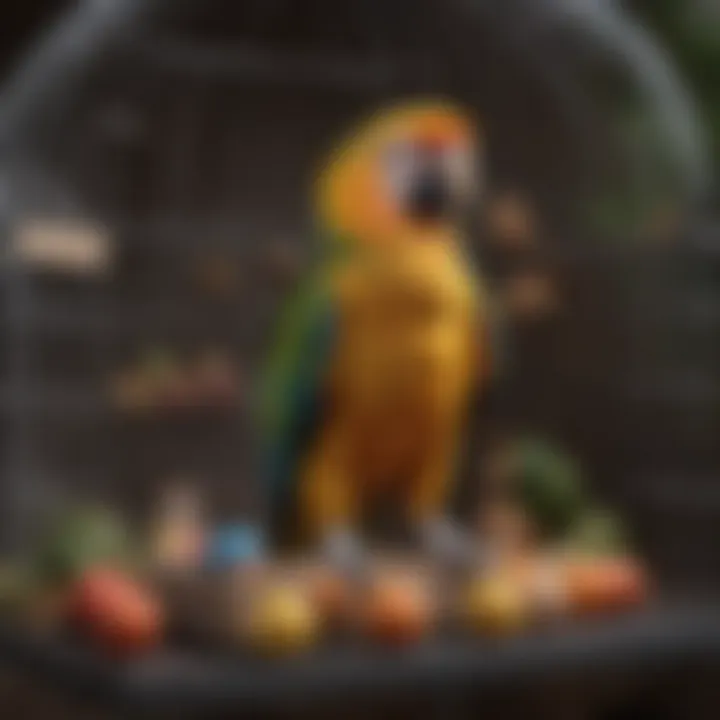
Environmental Hazards to Avoid
Your parrot’s environment should be as safe as it is stimulating. Be mindful of toxic plants, open windows, and any small objects they could swallow or choke on.
Signs of Illness or Distress
Being vigilant about changes in their behavior or eating habits is crucial. Watch for signs such as lethargy, changes in droppings, and loss of appetite. If you notice these behaviors, consult a vet promptly.
Fun Facts and Quirky Insights
Birds are fascinating creatures, and there are endless facts to delight any parrot enthusiast.
Unique Traits of Popular Bird Species
From the expressive African Grey to the cheerful Budgerigar, every species has its unique quirks. Some are known for their talking ability, while others are celebrated for their stunning colors and personalities.
Historical and Cultural Significance of Birds
Birds have played a significant role throughout history and cultures worldwide. From ancient civilizations viewing them as symbols of freedom to modern-day eco-activists raising awareness, understanding their impact can deepen your appreciation for these creatures.
Famous Bird Owners and Their Stories
Many celebrities have shared their lives with feathered companions. Famous personalities like John Lennon and his love for parrots speak to the bond that people can form with these avian beings, showcasing a fascinating intersection between the world of entertainment and avian companionship.
Take the time to genuinely understand your parrot—each little quirk melts into the greater tapestry of its personality.
As you delve deeper into the world of parrot care, you'll find that it’s a journey brimming with learning opportunities. Remember, the more you know, the better equipped you'll be to provide a loving and nurturing environment for your feathered friend.
Prolusion to Parrot Care
Caring for parrots is not just about feeding them and keeping them in a cage. It’s a commitment, one that requires understanding their unique needs and characteristics. This introduction sets the stage for a comprehensive exploration of parrot care, emphasizing that proper attention to nutrition, habitat, behavior, and health significantly affects the life quality of these vibrant creatures.
Birds, especially parrots, are more than mere pets; they’re companions with their own personalities. They require a well-rounded care approach, understanding that each species may have specific demands. For example, the needs of an African Grey may differ widely from those of a Macaw. Knowing the nuances between these species is essential in providing accurate care.
Understanding Different Parrot Species
The world of parrots is diverse. There are over 393 species, each with its own disposition, dietary preferences, and social needs. For instance, some love to chatter and interact, while others prefer solitary activities. Macaws, known for their assertive nature, require more space to roam than smaller birds like Budgerigars, which can thrive in less room.
Understanding the specifics can guide an owner in selecting the right food, social interactions, and housing arrangements. Research plays a pivotal role here – take time to read about the particular species you are interested in bringing home. The more you know, the better prepared you’ll be.
Importance of Proper Care
Proper care is paramount. It directly influences the well-being and life expectancy of your parrot. A well-cared-for parrot can live upwards of 50 years, but without proper attention, health issues can arise quickly. Neglecting their social needs can lead to behavioral problems like excessive screaming or feather plucking.
Additionally, it’s vital to understand that parrots benefit immensely from mental stimulation. This can come from engaging toys, time outside their cages, and social interaction with humans or other birds. Fostering an environment where they can thrive mentally and physically is critical. Overall, proper care ensures that your parrot not only survives but also flourishes.
"Investing time in understanding the species you’re caring for pays dividends, resulting in a thriving, interactive, and affectionate pet."
Nutritional Needs of Parrots
Proper nutrition for parrots isn't just a small piece of the puzzle; it's a rather significant cornerstone of parrot care. Just like us, parrots depend on a balanced diet to thrive. Inadequate nutrition can lead to numerous health problems and a shorter lifespan, making it essential for every bird owner to understand dietary needs deeply. A bird's diet can affect everything from its plumage color to its energy levels. This section will delve into the various dietary requirements that contribute to a parrot's overall well-being, ensuring that those who are caring for these beautiful creatures provide the best possible nutrition.
Basic Dietary Requirements
Parrots are omnivores, which means they require a variety of nutrients from both plant and animal sources. Their basic dietary requirements include:
- Proteins: Needed for growth, repair, and maintenance of body tissues. Sources can be legumes, cooked eggs, and specific bird pellets.
- Fats: Essential for energy and cell function. Healthy fats can be found in nuts and seeds, but moderation is key to prevent obesity.
- Carbohydrates: A primary energy source that can be obtained through grains and vegetables. These help maintain energy levels for a bird’s active lifestyle.
- Vitamins & Minerals: Vital for many bodily functions, including calcium for bone health and vitamins A and D for immune function. Each vitamin plays a unique role, underscoring the need for a varied diet.
Feeding your parrot a balanced mix that includes these components will help keep them healthy and lively.
Types of Food: Pellets vs. Seeds
When it comes to feeding, many owners are at a crossroads: pellets or seeds? Each type comes with its own set of advantages and disadvantages.
- Pellets: These are specially formulated to provide a balanced diet. They contain a mix of seeds, grains, and vitamins, making them a popular choice among avian veterinarians. Plus, pellets can prevent selective eating—where a parrot chooses the seeds they like and ignores others.
- Seeds: Traditional and often favored by birds due to their taste. However, a seed-only diet can lead to nutritional deficiencies since most seeds lack essential vitamins and minerals. It’s important to balance seeds with more nutrient-rich foods.
A well-thought-out combination can keep your feathered friend satisfied while also meeting their dietary requirements.
Fruits and Vegetables: What to Include
Fruits and vegetables are not only delicious to parrots, but they also offer vital nutrients that pellets and seeds alone simply cannot provide.
Include:
- Leafy Greens: Kale, spinach, and dandelion greens are great options.
- Fruits: Apples, bananas, and berries contribute essential vitamins and antioxidants.
- Colored Vegetables: Carrots and bell peppers are high in beta-carotene, crucial for maintaining strong vision and a healthy immune system.
It's critical to wash all produce thoroughly and cut them into manageable pieces to encourage your parrot to nibble away.
Supplements and Vitamins
Even with a balanced diet, some parrots may benefit from supplements. This is particularly true for birds that are picky eaters or those that require extra support during molting or breeding seasons.
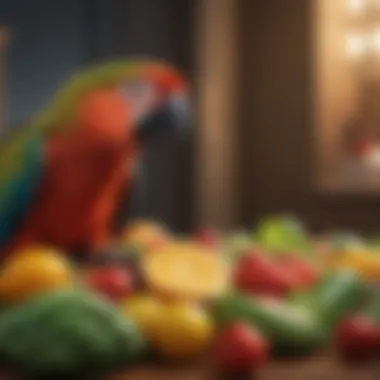

- Calcium Supplements: Crucial for egg-laying females to prevent egg-binding.
- Vitamin D: In some cases, birds living primarily indoors might not get sufficient sunlight for natural synthesis.
- Multivitamin Drops: These can serve as a safety net to ensure your parrot receives a complete range of nutrients.
Still, excessive supplementation can be dangerous, making regular consultations with an avian vet imperative to fine-tune your parrot's needs.
Common Dietary Mistakes to Avoid
Missteps in feeding can have lasting consequences. Here are pitfalls to look out for:
- Feeding Exclusive Seed Diet: As discussed earlier, seeds alone don't cover all bases. Relying solely on them can lead to deficiencies.
- Overfeeding Treats: While snacks make training enjoyable, they shouldn't make up more than 10% of a parrot's diet.
- Neglecting Fresh Foods: Dried fruits and veggies can lack the nutrition found in fresh produce. Always aim for a good mix.
- Ignoring Food Hygiene: Leftover food must be discarded to prevent spoilage and potential health hazards.
With attention to a parrot's nutrition, you can significantly enhance their quality of life and longevity. Remember, a well-fed parrot is a happy parrot.
Creating an Ideal Habitat
Creating an ideal habitat is paramount for the well-being of parrots, and it is an aspect often overshadowed by diet or social interaction. A parrot's environment plays a critical role in shaping its mood, behavior, and overall health. The right habitat can minimize stress, prevent behavioral issues, and encourage playful interactions. Moreover, when you take time to consider every element of your parrot’s living space, it allows for an enriching experience that can lead to a happier and healthier bird.
Choosing the Right Cage
Selecting the right cage is a non-negotiable first step in setting up a suitable habitat. Not all cages are created equal; the size, material, and design significantly impact your bird’s quality of life. A spacious cage allows parrots ample room to move around, stretch those wings and climb. If you have larger species like macaws or cockatoos, make sure your cage measures at least 3 feet wide and 5 feet high.
- Bar Spacing: Ensure that the bars are spaced correctly to prevent escape or injury. Bars spaced too wide can be problematic.
- Material: Opt for stainless steel or powder-coated cages as they are durable and safe.
- Design: Look for cages that facilitate easy access from different angles, as health checkups and interactions are crucial.
Placement of the Cage
Placement of the cage may seem minor, but it’s essentially where your parrot will spend a lot of its time. The cage should be placed at eye level or slightly above, as parrots feel more secure when they can survey their surroundings. Avoid placing the cage in drafty areas or direct sunlight.
Consider the following when you decide on a location:
- Social Interaction: Tuck the cage where it’s part of daily activities; your parrot craves company.
- Safety: Ensure the area is free of hazards like poisonous plants or other pets that could pose a threat.
Essential Accessories and Toys
Accessories and toys are vital for keeping your parrot mentally stimulated and active. Parrots are intelligent creatures that need engagement, or they may become bored and develop disruptive behaviors.
Include a variety of the following:
- Perches: Different perches with varying textures and sizes help exercise their feet and claws.
- Toys: Invest in chewable toys, puzzles, and foraging devices to entice natural behaviors. Rotate these items regularly to keep things fresh.
- Food and Water Bowls: Choose heavy, easy-to-clean designs and ensure they are positioned securely to prevent spills.
Environmental Enrichment Strategies
Environmental enrichment encompasses more than toys; it creates an engaging living space that encourages natural behaviors. Think of this as stimulating their instinctual desires.
- Foraging Opportunities: Hide treats in the cage or drain toys that compel them to search. Providing foraging material taps into their natural instincts.
- Plants: Adding safe, non-toxic plants to the habitat can improve air quality and give them a natural feel. Be sure to do your homework on which plants are safe.
- Interaction with Humans or Other Birds: Allowing controlled interactions can be rewarding and help build a strong bond with your feathered friend.
Temperature and Humidity Considerations
Temperature and humidity might not cross your mind initially, but they are significant variables to get right. Parrots thrive in environments that mimic their natural habitats, generally warm and humid. Keep the following in mind:
- Temperature Range: Aim for a consistent range of 70°F to 80°F. Avoid sudden temperature shifts, as they can cause stress or illness.
- Humidity Levels: A humidity level between 40% and 60% is ideal. If your home is quite dry, consider adding a humidifier or placing a shallow dish of water nearby.
An enriched habitat not only promotes physical health but also nurtures emotional well-being, building a stronger bond between you and your parrot.
Social Needs and Behavior
Understanding social needs and behaviors is fundamental to offering a fulfilling life for any parrot. These birds are known for their intelligence and social nature, akin to that of a three-year-old child. Recognizing this facet of their personality can significantly impact how they interact with humans and other creatures. Parrots, by nature, are flock animals. Their social structures in the wild involve complex relationships and hierarchies, making it crucial for pet owners to replicate some aspects of this social dynamic in captivity.
Understanding Parrot Communication
Parrots have an impressive ability to communicate, exhibiting a range of vocalizations and body language that conveys emotions and intentions. For example, a parrot might sway its head or puff its feathers when excited or content. On the flip side, a loud squawk or aggressive posturing may indicate distress or annoyance. By observing these subtleties, owners can better interpret their parrot’s needs.
Training your parrot to respond to specific cues can deepen their ability to communicate with you, forging a stronger bond. Remarkably, some parrots can mimic human speech, although this ability varies with species and individual personality. Don't underestimate the power of words; simple phrases repeated consistently can create a foundation for understanding between you and your fluffy friend.
The Importance of Social Interaction
Parrots thrive on interaction—without it, they could develop behavioral issues such as feather plucking or excessive screaming. Daily engagement and social activities are essential. This doesn't just mean talking or playing with them; it encompasses providing opportunities to explore, learn, and engage with their environment.
One could think of parrots as little Einsteins needing mental stimulation. Integrating routine social interaction will not only ensure their happiness, but also lead to healthier behaviors overall. Consider giving them time outside the cage to explore safely in your home while under supervision. Such experiences can fulfill their natural instincts and help them bond closer with you.
Responding to Your Parrot's Behavior
Recognizing and responding appropriately to your parrot’s behavior is key to developing a trusting relationship. Not every parrot is social or outgoing. Some might be timid or shy, requiring more patience and gentle encouragement. It's vital to observe their body language and sounds to determine how to react.
For example, if your parrot is pushing away from you or showing signs of agitation, it's often best to give them space rather than forcing interaction. Understanding these cues leads to a more trusting bond. Furthermore, reinforcing positive behaviors, such as stepping onto your hand or mimicking you, with treats can help establish desired habits.
Training Your Parrot: Techniques and Tips
Training your parrot doesn't have to be an uphill battle if approached correctly. Start with basic commands. Using consistent phrases combined with rewards can yield impressive results. Begin with simple tasks like "step up" or "come here." It is best to work on training when your parrot is alert and active, avoiding times when they seem sleepy or cranky.
A few key tips for training include:
- Short Sessions: Keep training sessions brief, no more than 5-10 minutes. Parrots have short attention spans.
- Positive Reinforcement: Reward desired behaviors consistently to encourage repetition.
- Patience is Key: Some parrots may take longer to learn certain tasks. Celebrate small victories!
- Variety is the Spice of Life: As parrots become adept at basic commands, progressively introduce new tasks to keep them engaged.
By understanding and nurturing their social needs, pet owners can create a dynamic and fulfilling life for their parrots. A responsive and enriched environment not only enhances their well-being but also allows pet owners to take part in a joyful and reciprocal relationship.
Health and Welfare Considerations
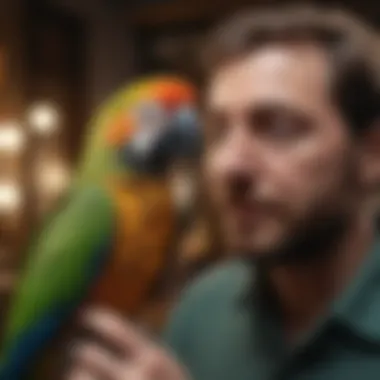
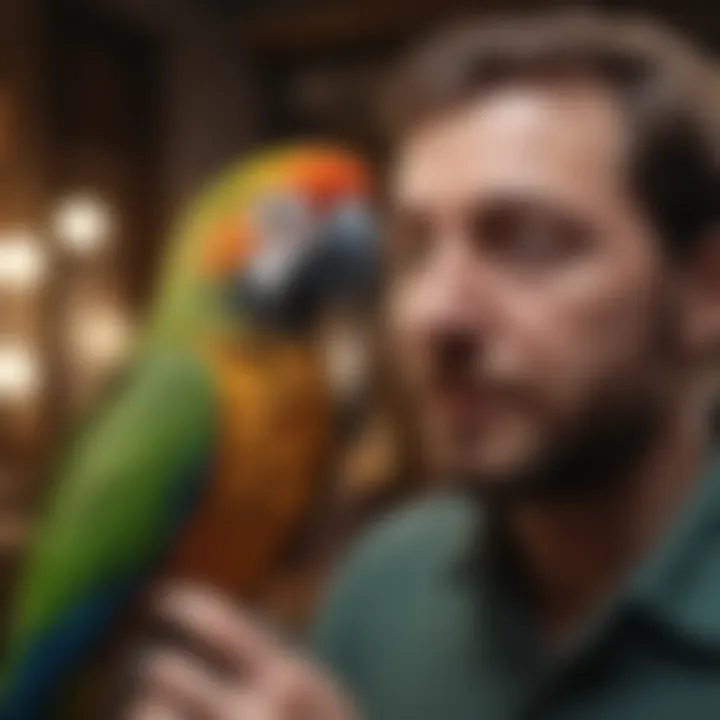
Health and welfare for parrots are of the utmost importance if you want a happy, healthy avian companion. A parrot's general well-being is closely tied to its care routine. This includes regular veterinary visits, understanding common health issues, and recognizing signs of an underlying condition. The rewards of prioritizing health are immeasurable, as it leads to an enhanced quality of life for your feathered friend and a more fulfilling experience for you as an owner.
Regular Health Checkups
Routine health checkups are essential for keeping your parrot in tip-top shape. Just like with humans, about once a year is a good rhythm for these checkups. Regular vet visits can catch early signs of health issues that might otherwise go unnoticed. This might include blood tests, fecal exams, or simple weight checks, which can provide deep insights into your parrot's condition.
Additionally, getting your parrot accustomed to being handled and examined by the vet during these visits can make things smoother down the line. Birds can be skittish, so familiarizing them with their vet from a young age can develop a trusting relationship that benefits their overall care.
Common Health Issues in Parrots
Despite our best intentions, parrots can face a multitude of health challenges. Here are some common issues:
- Feather plucking: Stress, boredom, or underlying health problems can cause this behavior.
- Psittacosis: A bacterial infection that’s contagious and can affect both birds and humans, characterized by respiratory issues.
- Obesity: Most often due to a poor diet and lack of exercise, leading to various health complications.
- Respiratory problems: Often stemming from poor air quality or exposure to toxins, leading to wheezing or difficulty breathing.
Being vigilant about such conditions can help mitigate these problems before they escalate, so keep an eye out.
Signs of Illness to Watch For
Taking notice of your parrot's behavior can be life-saving. Here are signs that indicate your feathered friend may be under the weather:
- Changes in appetite: Either ceasing to eat or eating excessively.
- Changes in droppings: You should regularly check their droppings; changes in color, consistency, or amount can be a surefire signal something’s off.
- Lethargy: If your parrot seems less energetic or more isolated than usual, it might not be feeling well.
- Uncharacteristic vocalizations: Changes in their usual chirps or squawks may hint at an underlying issue.
Assessing these signs quickly can lead to timely interventions and treatment.
Emergency Care Guidelines
In case of sudden illness or injury, quick action can make the difference. Here’s how to be prepared:
- Have a first-aid kit: Basic materials like gauze, antiseptic for wounds, and a bird-safe thermometer can be handy.
- Know your emergency vet: Research and locate a vet who specializes in avian care. Keep their contact information accessible.
- Be ready to react: If your parrot shows signs of distress—like labored breathing or extreme lethargy—don’t hesitate. Transport them to a vet immediately while keeping them calm.
Remember: Staying informed and prepared is the key to ensuring healthy returns from any unexpected health scare.
Ultimately, regular checkups, knowledge of health issues, awareness of illness signs, and preparation for emergencies sit at the core of responsible parrot ownership. Caring for your parrot in these ways not only promotes its welfare but also fosters a deeper bond between you and your feathered companion.
The Emotional Bond with Your Parrot
Creating a solid emotional bond with your parrot is not just a nice-to-have; it's fundamental to fostering a harmonious living environment. Parrots are known for their intelligence and social nature. They thrive on interaction and connection with their human companions. A deep emotional bond goes a long way in ensuring the health and happiness of your feathered friend, offering a haven of security and companionship. When you invest time to understand and connect with your parrot, you’re not only nurturing an animal; you’re forming a friendship that can yield immense rewards.
Building Trust and Affection
The first step in establishing an emotional bond is building trust. Birds can be cautious by nature; they’re hardwired to be wary of potential threats. To break through that shell of apprehension, patience and consistency are crucial. Start with soft, gentle tones when speaking to your parrot. Offer treats from your hand, allowing them to associate you with positivity and safety.
- Here are some ways to build that crucial trust:
- Consistency: Keep a routine. Parrots love familiarity, whether it's feeding at specific times or having a regular playtime.
- Body Language: Pay attention to how you present yourself. Avoid sudden movements that may frighten them – slow, deliberate actions go a long way.
- Positive Reinforcement: Celebrate small victories! When your parrot takes a step closer to you, offer a reward.
This trust creates the groundwork for affection to blossom between you and your parrot, leading to a strengthened bond.
Recognizing Your Parrot's Unique Personality
Every parrot has a distinct character that flourishes through time and interaction. Just like humans have different quirks and traits, so do our feathered friends. Some might be adventurous and outgoing, while others may be more reserved and shy. Recognizing and embracing these unique personalities will foster a much deeper connection.
- Consider these aspects:
- Observational Learning: Watch how your parrot reacts in various situations. Do they prefer quiet moments or lively environments?
- Individual Preferences: Make a note of their favorite toys, colors, and sounds. Tailoring their environment to fit their tastes can work wonders.
- Behavioral Responses: Learn to read body language. Is your parrot puffed up? That might mean they’re feeling unsure. A relaxed body stance indicates comfort.
Understanding these nuances not only enhances your relationship but also allows you to create an enriched environment that caters to their unique needs.
The Role of Play in Strengthening Bonds
Play is one of the most enjoyable ways to strengthen the bond between you and your parrot. Engaging in playful activities reinforces trust and affection while providing mental stimulation. Parrots are naturally curious and love to explore, making playtime essential for their well-being.
Here are some tips for incorporating play into your routine:
- Interactive Toys: Invest in toys that require puzzling to engage your bird’s mind. Toys that dispense treats can offer a reward system.
- Shared Activities: Try playing games alongside your parrot, like fetch with lightweight balls. Watching you mimic their actions can be captivating.
- Free Flight: If it’s safe, allow them some supervised time outside the cage. Letting them stretch their wings can be liberating and foster excitement.
Remember, time spent playing translates into time spent connecting.
"In the world of parrot care, the emotional bond should never be underestimated. It’s the fabric that weaves together the needs of nutrition, habitat, and health into a complete living experience."
By focusing on trust, recognizing individual personalities, and emphasizing play, you’re setting the stage for a life that both you and your parrot can enjoy to the fullest. This not only contributes to your parrot’s emotional well-being but also enriches your life as a bird owner.
End: Comprehensive Approach to Parrot Care
Considering all facets of parrot care, it’s paramount to understand that a holistic approach yields the best results. By marrying nutrition, habitat, and social interaction, owners create a nurturing environment that fosters both the physical and emotional well-being of their feathered companions. Lack of attention to any one element can lead to adverse effects, not just in health but also in behavior and overall happiness. A parrot is not merely a pet; it’s a member of the family, deserving of well-planned care to thrive.
Balancing Nutrition, Environment, and Social Interaction
When we think about parrot care, one size definetely does not fit all. It's crucial to find a balance between nutrition, environment, and social interaction. Each of these components feeds into the others in deeply intertwined ways. For instance, when parrots receive a balanced diet filled with fresh fruits, vegetables, and quality pellets, they are more likely to adapt to their habitat positively. A good diet strengthens their immune systems, making them less susceptible to disease, which can lead to a happier bird and happier owner.
On the other hand, the environment plays a significant role. For example, if you keep your parrot in a cramped cage, it doesn't matter how well you feed it; stress can hinder its ability to flourish. Likewise, providing social interaction through playtime and training enhances their mood and plays a significant part in their overall health. Parrots are social beings that floursh on engagement, and failing to meet their social needs can lead to destructive behaviors or depression. Keeping everything balanced is the key; this harmony is essential in ensuring a fulfilling life for both the bird and its owner.
Continued Learning and Adaptation
Besides the consistency of good practices, continued learning is vital. The realm of avian care is always evolving. New research sheds light on best practices, and owners should be diligent in seeking out this information. Books, seminars, and online forums provide invaluable knowledge that can help refine care strategies. Being part of a community, like Reddit, can unveil tips and tricks those with more experience often share freely. Each parrot is unique, with its own personality and needs. So, being ready to adapt your care techniques as you learn more about your individual parrot is crucial.
Staying attuned to advances in avian sciences can change the way you view parrot care, making it not just a task but a constantly evolving bond.















